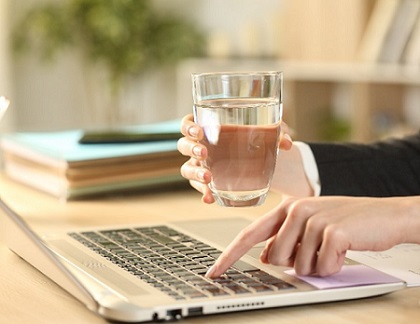More and more people are passionate about and focus on a healthier and more active lifestyle, not only because of its positive effects on health, but also because it allows them to feel better in general. Moreover, various activities may also be performed by the entire family. When we start playing sports or do some physical activities, we also need to drink more water on a daily basis. Water is as important and significant to human health as physical activity to ensure good brain function, energy and body tone. Nowadays, with the wide availability of literature and the Internet, it seems that we have already learned everything possible about water. However, there are still a number of myths about water consumption in society.
Myth No. 1: Flavoured water is more harmful than ordinary water
 There is a myth in society that water with flavourings is more harmful than ordinary water. Nutritionist Ksenija Adrijanova explains that the main thing to pay attention to is the label of the bottle: on the shelves of shops there are also types of water in which the sugar is not less than in lemonades. However, if sugar is indicated in the water, it would not be advisable to choose such water. But at the same time, there are also types of water with flavours that do not contain sugar and at the same time serve as a great choice for those who cannot enjoy and fully drink mineral water.
There is a myth in society that water with flavourings is more harmful than ordinary water. Nutritionist Ksenija Adrijanova explains that the main thing to pay attention to is the label of the bottle: on the shelves of shops there are also types of water in which the sugar is not less than in lemonades. However, if sugar is indicated in the water, it would not be advisable to choose such water. But at the same time, there are also types of water with flavours that do not contain sugar and at the same time serve as a great choice for those who cannot enjoy and fully drink mineral water.
Myth No. 2: The magnesium in “Sport” water helps muscles recover faster after workout
A nutritionist explains that adding magnesium to drinking water does not mean that it will promote muscle recovery after a workout. Unfortunately, there are no studies that show how much magnesium-containing water needs to be drunk in order for the body to recover faster - this opinion is just a myth. Although the combination of magnesium and vitamin B6 helps to prevent seizures, in this case, first of all, it is a question of vitamins, and secondly, it is a question of a certain amount that cannot be attributed to water consumption, emphasizes the nutritionist.
Myth No. 3: Do not drink a lot of mineral water
Initially, only healing water containing increased amounts of minerals and salts was available for home consumption, but those times are long gone. Currently, mineral water is divided into four categories: water with low, moderate and high degree of mineralization and healing mineral water. This classification is based on the predominant salts in the water, therefore - the saltier the taste of the water, the higher the degree of mineralization is. However, the lion's share of the water supply, which can be purchased from store shelves today, differs in the permissible degree of mineralization, and it can be consumed in unlimited quantities, but one can also find healing water. Therefore, nutritionist Ksenija Adrijanova, before purchasing water, recommends checking the degree of mineralization of water so that it is at an optimal level, but not increased. Often many do not distinguish between mineral water and drinking water, given that the two types of water are sold in shops and look very similar, but it is preferable to prefer mineral water because, unlike drinking water, it is less subject to treatment, which unfortunately cannot be attributed to drinking water.
Myth No. 4: Do not drink water during training and competitions
People who have recently started to do more sports have different opinions about water intake during training. Based on the assumption that in the past, professional athletes were not allowed to drink water during the competition, believing that they become slower and more difficult to manoeuvre due to this reason, so even today many avoid drinking water during sports. However, in fact, drinking water is allowed and even necessary. Trainer Sendija Gabriela Oficiere explains that the best solution during training is to drink a small amount of water every 15 minutes, if you drink too much water, it will be difficult to actively train, but this certainly does not mean that you should not drink water.
Myth No. 5: Do not drink water for 30 minutes before and after eating
Nutritionist Ksenija explains that there is a belief that the amount of water consumed dissolves gastric juice, which impairs digestion of food, thus contributing to weight gain. In fact, this is a misconception: it is not recommended to take water when the food in the mouth has not yet been chewed. Initially, the food should be chewed and swallowed well, only then can water be drunk. In this context, parents need to keep track of whether their children are eating properly. But the notion that you should not drink water for half an hour before and after eating is a myth.